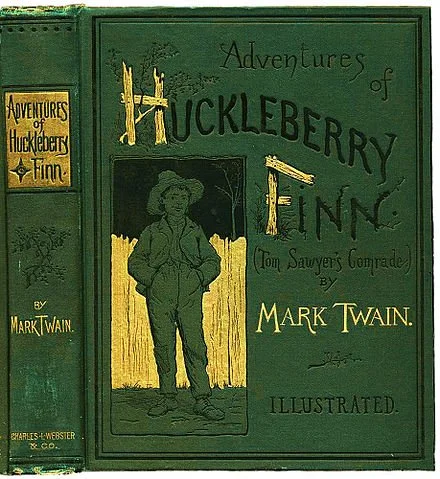Chris Powell: The misnamed 'Banned Books Week'; about that bus highway
Mark Twain's famed novel has been banned in some American schools because of its racial language.
MANCHESTER, Conn.
Last week was what librarians and leftists in Connecticut and throughout the country call Banned Books Week. A more accurate name for it would be Submit to Authority Week.
The week is misnamed because in the United States there are no banned books at all -- no books whose publication and possession are forbidden by government. Banned Books Week has been contrived by librarians and leftists to intimidate people out of criticizing certain books that librarians and school administrators have chosen for inclusion in school libraries, curriculums, and public libraries. The objective is to prevent libraries and schools from ever having to answer to anyone for their choices.
The selection of every book for a library or curriculum is always a matter of judgment. But the promoters of Banned Books Week would have the public believe that the choices made by librarians and school administrators are always right, and that anyone who questions these choices is a follower of Hitler or, worse, Donald Trump.
Some criticism of library and curriculum choices is nutty. Two great works of American literature that have helped to defeat racism -- Mark Twain's The Adventures of Huckleberry Finn and Harper Lee's To Kill a Mockingbird -- are sometimes targeted by people who can't get past the occasional racist language in them.
But these days most books whose inclusion in schools and libraries are challenged involve homosexuality and transgenderism, and these are fairly challenged at least in regard to their appropriateness for children, especially amid the mental illness that is worsening among them.
This doesn't mean that such books should be excluded automatically but that their appropriateness should be settled by thoughtful review and discussion. Calling a book's critics "book banners" and a book's advocates "groomers," as is common in these controversies, is not thoughtful.
The great irony of Banned Books Week is that as a practical matter its promoters are themselves the biggest book banners. That is, with a virtually infinite number of books in the world, librarians and school administrators reject thousands of books for every one they include.
Of course not all books can be included in any library or curriculum. Do the choices that are made give a politically balanced view of the world and academic subjects or a politically skewed and propagandist one?
If Banned Books Week succeeds, no one will ever know -- which is the idea.
Shelter along the CTfastrak route
The once-controversial bus highway between Hartford and New Britain, CTfastrak, has been operating for 10 years, and this week Connecticut's Hearst newspapers sought to determine if, after a construction cost of more than half a billion dollars, the busway can be considered a success.
CTfastrak has turned 10 and seen an increase in riders from a pandemic dip
CTfastrak has turned 10 and seen an increase in riders from a pandemic dip
CTfastrak has turned 10 and seen an increase in riders from a pandemic dip
CTfastrak has turned 10 and seen an increase in riders from a pandemic dip
The state Transportation Department says the highway had 2.8 million riders in 2016, its first full year of operation, reached a peak of 3.3 million riders in 2019, and then, amid the Covid-19 epidemic, fell to about 2 million riders in 2021 and has been slowly increasing since.
But the chief of the department's Bureau of Public Transit, Ben Limmer, was unable to provide information crucial to a judgment on the project. While it stands to reason that the bus highway has reduced automobile commuting between Hartford and New Britain, the department says it has no data on that. More concerning is that the department can't or won’t say how much each CTfastrak rider is being subsidized by state government.
"We do what we can to make sure fares are affordable," Limmer said. "I assume fares have not kept up with inflation, so we’re probably flat or slightly up on subsidies."
All modes of transportation -- sidewalks, streets and highways, trains, and airplanes -- are subsidized by government in some way. But now that the epidemic-induced trend of working from home has greatly reduced commuting, CTfastrak is even more questionable than it was when it began.
Does the Transportation Department want to know what CTfastrak’s operating costs are and how much riders are being subsidized? It doesn't seem to want the public to know.
Chris Powell has written about Connecticut government and politics for many years (CPowell@cox.net).

